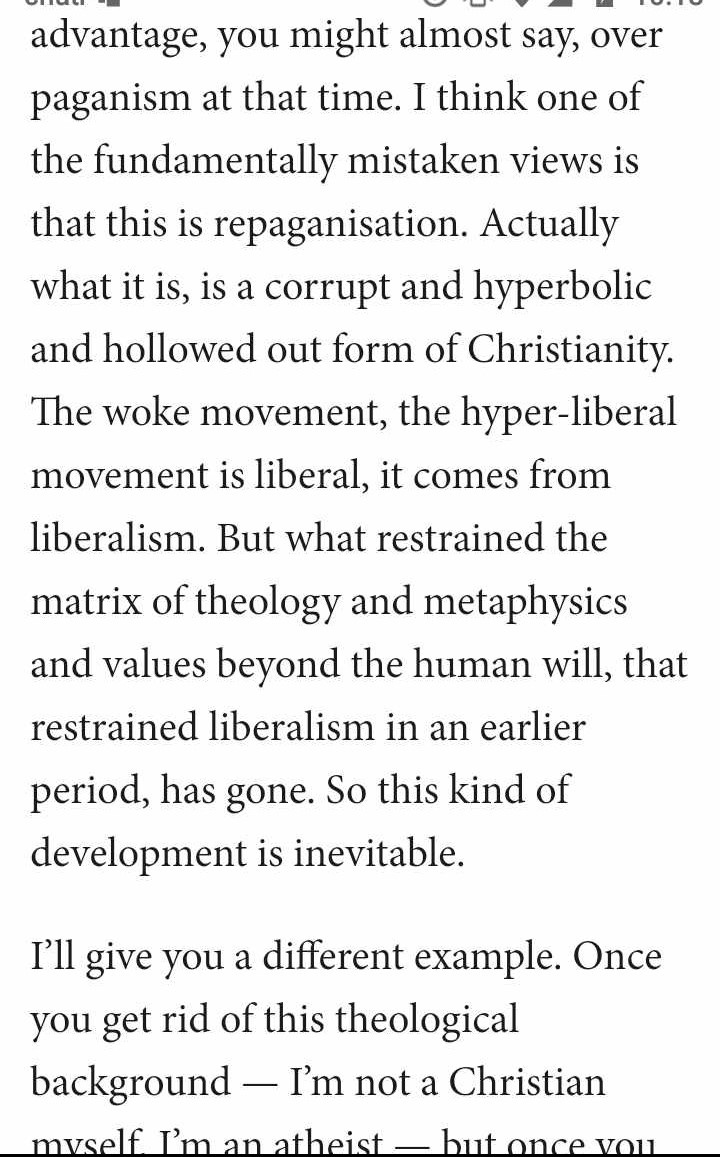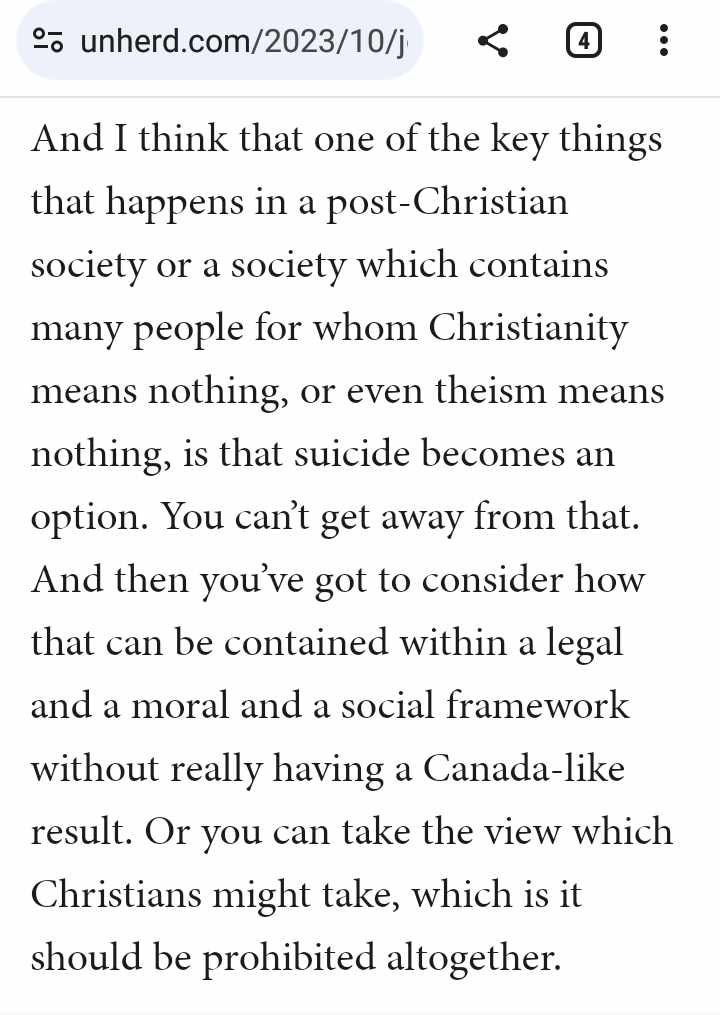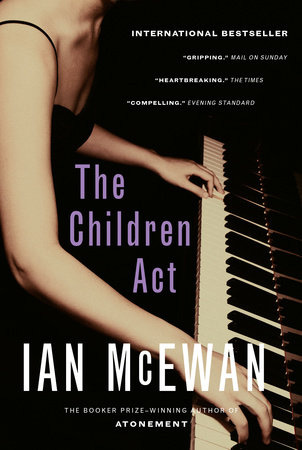We have become, it appears, an international cautionary tale on the topic of medically assisted dying legislation and practices. I remember Dr Harry Marsh, a well-known surgeon and patron of the UK’s My Death, My Decision campaign, praising Canadian legislation in a BBC interview a couple of years back, but this was well before the flurry of news reports about people with severe mental conditions (that make them believe they cannot live anywhere in the modern world due to widespread chemicals) and people in dire need of social services being offered and opting for the MAiD route. The government has since paused the expansion of MAiD to include mental distress but that conversation is to return.
These days we tend to pop up as an example of a MAiD policy gone rogue. (The Benelux countries somehow duck under the radar, though their policies are even less restrictive.) If the mental health suffering expansion on MAiD proceeds as planned, we may find ourselves in a country where it will be harder, with our long mental healthcare waitlists, to find a psychotherapist to help you out of suicidal ideation than to find two MDs who will help you realize it. When the grand deinstitutionalization of mental health patients took place some forty years ago, few argued it would be an excellent money-saving mechanism - but that is what it primarily ended up being. Patients were liberated out of “oppressive” institutions in whose care they lingered, only to find themselves on the streets. It will transpire too that it is more expensive to keep the mentally distressed alive than the alternative.
All this and much else came to mind while I was reading the latest John Gray longform interview on UnHerd. John Gray be John Graying, naturally. He’s still declaring that the death of liberalism is just around the corner - no, it’s already taken place (for decades now); he’s still an atheist who doesn’t believe human life is in any way special-er than the other animals’; he’s still anti-globalist and a mix of reactionary-socialist; a pessimist regarding any notions of moral progress. But to a question from the audience about the assisted suicide he produced a surprisingly coy answer; either he hasn’t worked out what he believes about it yet, or is saving his thunder for a longer piece on the topic.
Is the expansion and normalization of medically assisted suicide a) confirmation of the further de-Christianization of western societies, a paganization, or b) something on the continuum of the liberal individual choice, or c) a sort of perverted Christian compassion. He goes for a combination of b) and c). “The matrix of theology and metaphysics and values beyond the human will that restrained liberalism in an earlier period is gone.”
But then he comes to sound a bit more like John Gray - who I expected would be more accepting of an individual’s right to go when they want, except that for him it probably smacks too much of liberal individual choice. As we become more secular, it is unsurprising for suicide destigmatization to emerge on the horizon. Perhaps not to the degree that some non-Christian societies of the past normalized it - but who’s to tell where it’s all going.
I did expect him to go for a) immediately.
And just this weekend I gobbled up Ian McEwan’s The Children Act, his 2015 novel about a judge who is deciding whether a 17-year-old from a Jehovah’s Witnesses family should be overruled by the hospital and made to take transfusion to save his life. I love Ian McEwan, so sue me. (Pace his one big misfire, Saturday.) Yes, today he’s only capable of writing upper middle class characters who recite poetry and listen to (and play) classical music - and even if he attempts non-bobo characters, those will still love poetry and classical music. Yes, his novels sometimes read like a Radio 4 debate, or a grad philosophy essay. Even at his worst, he’s better than most. I will defend him as my comfort food. But I digress.
The Children Act is about whether the state can overrule parents and churches when it comes to a child’s welfare, and there are subtle arguments throughout on when anyone, child or adult, can be forced into a course of medication for their own good. (Cue the Covid memories… and Sam Harris’ argument that, had Covid been the kind of virus that kills children, there’d be a strong consensus on a near-police state until it was eradicated or under control. But it wasn’t killing children, and the democratic states one by one still took it upon themselves to decide the degrees of risk allowed on behalf of each of us.)
The family court judge, her name is Fiona Maye, had once had to decide whether the parents are allowed to separate conjoined twins because only one had a complete set of organs while the other was incomplete and using the brother as the source of life while slowly killing him. We learn of many other cases, most involving a religious belief in direct clash with what the secular, modern society believes is the child’s best interest and necessary conditions for thriving. But it’s the Jehovah’s kid that’s at the centre of the book, and this not being a philosophical essay after all but Ian McEwan, a macabre, and unexpectedly Romantic aspect of the novel makes itself known after the judge meets the young one in the hospital, talks to him at length, and makes her decision.
If you care about spoilers, you can stop reading now, but after she saves his life by allowing the hospital to transfuse him against his and the wishes of his family, the kid’s leukemia medication works and he is out of the hospital within weeks. A parallel story is the one of Fiona’s marriage hitting some mid-life Scylla and Charybdis and the two stories spill one into another subtly. The young man, having lost his faith, and with it his close connection to his parents and an entire community, bursts into the freedom and a life of possibilities… to find himself hankering for enchantment, for meaning, and seeing it in the judge herself. The two are tied with life and death ties forever, but while she barely notices this and continues with her life, Adam (that is his name) is in the grip of something he can’t comprehend. Is it the need for a guru, a messiah, of this secular, multi-potential life? Is he basking in the blaze of Being, after narrowly avoiding death? Or is it erotic love?
While being a court procedural, it’s also a blend of Joyce’s “The Dead” and any number of Romantic songs that feature in the book, especially Berlioz’s “Nuits d’été” and Mahler’s “I am lost to the world”, this novel. Under the silks and hospital scrubs, a blood-filled heart.
Meanwhile I await the first Canadian MAiD novel. What is it going to be? Fingers crossed it’s half-decent.






It was shortly after the Netherlands legalized assisted dying that McEwan wrote Amsterdam, but would a Canadian house publish something that caustic and satirical today about MAiD? I’d expect something more Jodi Picoult from our locals in the subject.